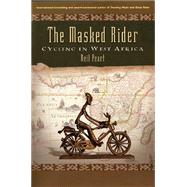
What is included with this book?
| Part One WHITE MAN, WHERE YOU GOING? | |||||
|
3 | (20) | |||
|
23 | (22) | |||
|
45 | (16) | |||
|
61 | (10) | |||
|
71 | (18) | |||
| Part Two EPIPHANIES AND APOSTASIES | |||||
|
89 | (16) | |||
|
105 | (22) | |||
|
127 | (26) | |||
|
153 | (12) | |||
|
165 | (12) | |||
|
177 | (20) | |||
|
197 | (12) | |||
|
209 | (14) | |||
| Part Three WHITE MAN, WHAT YOU DOING? | |||||
|
223 | (16) | |||
|
239 | (18) | |||
|
257 | (20) | |||
|
277 | (14) | |||
|
291 |
The New copy of this book will include any supplemental materials advertised. Please check the title of the book to determine if it should include any access cards, study guides, lab manuals, CDs, etc.
The Used, Rental and eBook copies of this book are not guaranteed to include any supplemental materials. Typically, only the book itself is included. This is true even if the title states it includes any access cards, study guides, lab manuals, CDs, etc.
After much searching I found a name — Bicycle Africa — and signed up for a month–long tour of “Cameroon: Country of Contrasts.” At the end of it I swore I’d never do anything likethatagain — but the following year I forgot my vow, and returned to bicycle through Togo, Ghana, and the Ivory Coast.
Cycling is a good way to travel anywhere, but especially in Africa; you are independent and mobile, and yet travel at “people speed” — fast enough to move on to another town in the cooler morning hours, but slow enough to meet the people: the old farmer at the roadside who raises his hand and says “You are welcome,” the tireless woman who offers a shy smile to a passing cyclist, the children whose laughter transcends the humblest home. The unconditional welcome to tired travelers is part of the charm, but it is also what is simply African: the villages and markets, the way people live and work, their cheerful (or at least stoic) acceptance of adversity, and their rich culture: the music, the magic, the carvings — the masks of Africa.
Africa is such a network of illusions, a double–faced mask. It is as difficult to see into it as it is to see out of it. To those who’ve never been there it is an utter mystery, a continent veiled in myths and mistaken impressions, but it is equally obscure to those who have never been anywhere else. It used to be said that electronic media would bring the world closer together, but too often the focus on the sensational only distorts the reality — drives us farther apart. That is why in Ghana the children followed me down the street chanting “Rambo! Rambo!” and that is why Canadians look at me as if I were a lunatic when I tell them I’ve been cycling in Africa — they can only picture it from wildlife documentaries, TV images of starvation camps, and old Tarzan movies.
Africa fascinates me — in the true sense, I suppose, as a snake is said to transfix its prey. And the more times I return, the more countries I visit, the more the place perplexes me. Africa has so much magic, but so much madness. Yet I keep returning, and surely will again. This attraction is compelling and seems to grow stronger, but, like any lasting relationship, it is no longer blind.
And maybe that’s always true. After the first infatuation we’re always most critical of what wefeelthe strongest about. It’s too often the case in relationships, and certainly regarding one’s own family or country. You can criticize your own, but don’t let anyone else try it. That’s when love shows its teeth.
If my attraction to Africa is no longer blind, it is still blurry. From within and without, Africa is as much the “Dark Continent” as it was two hundred years ago — hard to see into, hard to see out of. The mask obscures a face which is so complex and contradictory; it takes a lot of traveling even to get a sense of it. And traveling in Africa is, by necessity, adventure travel.
Some people travel for pleasure, and sometimes find adventure; others travel for adventure, and sometimes find pleasure. The best part of adventure travel, it seems to me, isthinkingabout it. A journey to a remote place is exciting to look forward to, certainly rewarding to look back upon, but not always pleasurable to live minute by minute. Reality has a tendency to be so uncomfortablyreal.
But that’s the price of admission — you have to do it. One reason for making such a journey is to experience the mystery of unknown places, but another, perhaps more important, reason is to take yourself out of your “context” — home, job, and friends. Travel is its own reward, but traveling among strangers can show you as much about yourself as it does about them. To your companions and the people you encounteryouare the stranger; to them you are a brand–new person.
That’s something to think about, and if you try you might glimpse yourself that way, without a past, without a context, without a mask. That can be a little scary, no question, but you may get a look behind someone else’s mask as well, and that can be even scarier.